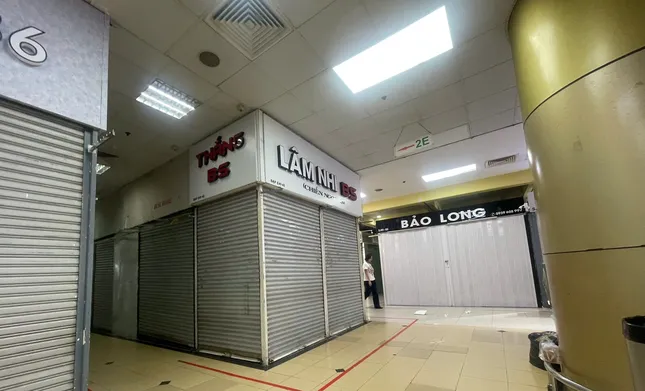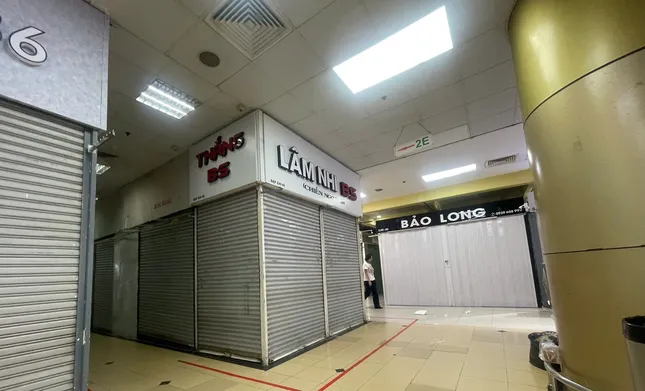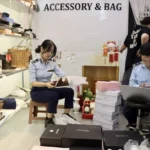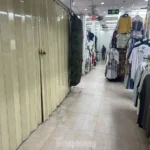Information provided to Tien Phong by a representative of the Department of Market Management – Department of Domestic Market Management and Development, Ministry of Industry and Trade, revealed that market management forces in collaboration with the police, customs, and medical authorities have been conducting inspections at major markets and retail outlets, leaving no stone unturned.
Authorities have discovered numerous shops and small businesses operating without invoices, documents, or proof of product origin, with many selling counterfeit and fake goods. This has led to a significant number of violations, especially in Hanoi and Ho Chi Minh City’s markets and shopping centers, causing anxiety and fear of inspections and penalties among small businesses.
According to the representative, the recent closures of many small businesses indicate a pervasive issue of counterfeit, fake, and unclear origin products in the market. “If there wasn’t an issue, why would shops shut down?” they questioned, emphasizing the necessity of addressing these issues to enhance transparency and protect both consumers and the integrity of the market.
In the long run, the market demands transparency and fair competition. Small businesses should review their product origins and promptly adopt electronic invoices to avoid penalties. Consumers, on the other hand, are advised to purchase products with clear origins, invoices, and QR codes from reputable shops.

A number of stalls at An Dong Plaza in Ho Chi Minh City were closed due to concerns over inspections by authorities.
In recent days, there has been a growing trend of small businesses simultaneously closing their doors in key markets, traditional markets, and shopping centers in Hanoi, Ho Chi Minh City, and other major provinces. This is primarily due to intensified inspections and crackdowns by market management forces, economic police, and specialized units targeting violations related to product origins, counterfeiting, smuggling, and commercial fraud.
On June 11, nearly two-thirds of the kiosks on the first and second floors of Dong Xuan Market in Hanoi were closed. A similar situation occurred in An Dong Market (Ho Chi Minh City), Tan Binh Market, and several shopping centers engaged in wholesale consumer goods trading. In these areas, numerous kiosks were locked up without any signs of business activity or merchandise restocking.
An anonymous small business owner shared, “Lately, everyone has heard that the authorities are conducting stringent inspections, so many people choose to temporarily cease operations to avoid potential risks, as some goods may lack the necessary invoices and documents.”
In the first ten days of June alone, authorities handled hundreds of cases involving large quantities of goods of unclear origin, mislabeled products, and even counterfeits of famous brands. The most inspected items included fashion, cosmetics, consumer goods, dietary supplements, and household appliances.
Notably, some markets were found to be complicit in facilitating the entry of smuggled goods across borders, with Chinese products being disguised as Vietnamese to deceive consumers.
Lawyer Nguyen Thanh Hai from the Hanoi Bar Association commented that while the crackdown on retail outlets and large markets is necessary to protect consumers and uphold the reputation of Vietnamese goods, it only addresses the tip of the iceberg. Illicit goods from China, Thailand, and Cambodia continue to flood the domestic market through intricate networks. Without stringent controls at border gates and import channels, tackling counterfeiting and smuggling is akin to “catching frogs in a pond.”
According to Mr. Hai, authorities should employ transparent inspection methods to avoid causing panic and negative reactions among small businesses. Additionally, they should provide support to small businesses in completing paperwork and clarifying product origins, rather than solely focusing on penalties.
“The authorities need to provide clear answers on issues such as the treatment of existing inventory, the time frame given to small businesses to prepare invoices and receipts, and the availability of support in administrative and legal procedures. This will enable small businesses to adapt to the new changes,” Mr. Hai added.
Heavy Fines for Two Businesses Selling Counterfeit Hermès and Chanel Goods
The local authorities in Da Nang have taken a strong stance against counterfeiting, issuing fines and enforcing the destruction of fake goods bearing renowned brand names.
An Unprecedented Scene at Ho Chi Minh City’s Shopping ‘Mecca’
The bustling shopping districts and malls of Ho Chi Minh City, once hailed as a shopper’s paradise, are now witnessing a stark contrast. An array of kiosks and shops lie dormant, their gates locked and shutters tightly drawn, creating an eerie silence in what was once a vibrant hub of commercial activity.
A Sea of Shuttered Stalls: The Anxiety that Engulfs Ho Chi Minh City’s Iconic Markets
The issue of traders shutting down their stalls to avoid inspections is not new, but its frequency is increasing.













































